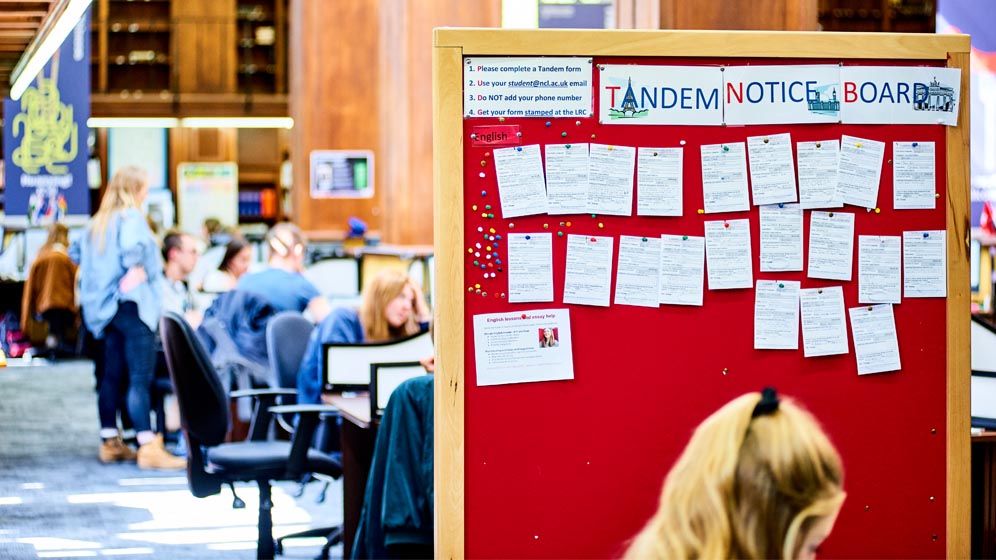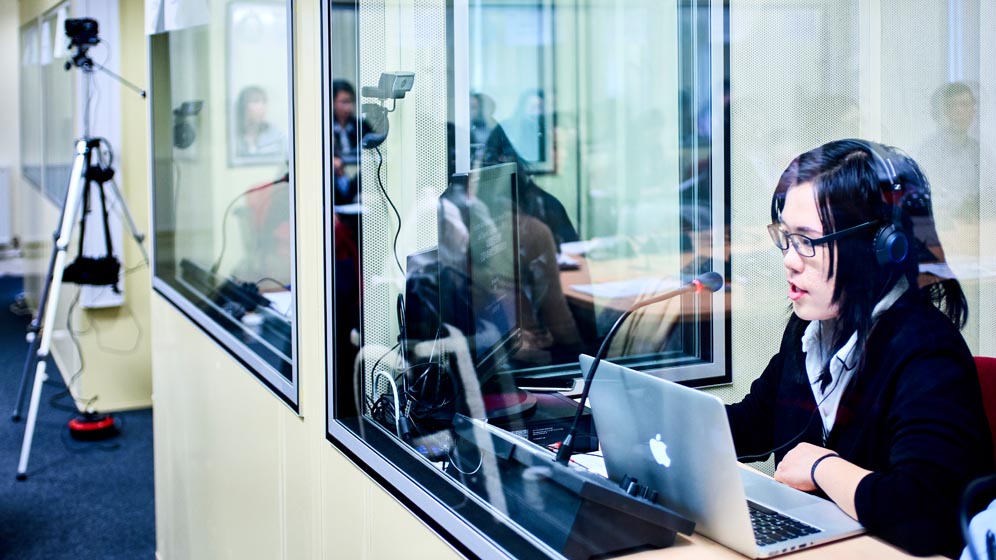Modern Languages and Business Studies BA Honours
- UCAS code: TN92
- Full time
- 4 years
This Modern Languages and Business Studies degree prepares you for a global career with language skills and business expertise.
You are currently viewing course information for entry year: 2026
Next start date:
- September 2026
UCAS Institution name and code:
- NEWC / N21
Course overview
This Modern Languages and Business Studies BA Honours degree will equip you with the skills and knowledge that are highly prized by employers.
Flexible language choices
Study one or two languages and develop near-native fluency through engaging, practical learning. You'll have the opportunity to study the cultures of the languages you choose through a range of optional modules.
Choose from the following languages:
- Chinese or Japanese
- French
- German
- Portuguese (from beginner's level only)
- Spanish
You could continue learning a language you have studied before and/or try something completely new.
Business Management
Understand the principles and practice of business management through topics such as:
- understanding work and organisations
- marketing
- human resource management
Benefit from the flexibility of an optional Year Abroad or UK Careers Placement
Shape your degree to suit your personal and professional goals with one of three flexible options. You can choose to:
- spend a year abroad in your third year to develop your language skills among native speakers and experience a different culture
- undertake a Careers Placement Year in the UK in your third year to gain valuable work experience
- complete your degree in 3 years without spending time on a Year Abroad or on a Careers Placement Year
Regardless of what you choose to do, you will confirm this with us in Stage 2 after receiving guidance and support.
Study with us and become a confident linguist, ready to embark on your career journey as a global citizen.
Find out more about other undergraduate programmes on the School of Modern Languages website.
Sorry, you need JavaScript to view this video
Your course and study experience - disclaimers and terms and conditions
Please rest assured we make all reasonable efforts to provide you with the programmes, services and facilities described. However, it may be necessary to make changes due to significant disruption, for example in response to Covid-19.
View our Academic experience page, which gives information about your Newcastle University study experience for the academic year 2025-26.
See our terms and conditions and student complaints information, which gives details of circumstances that may lead to changes to programmes, modules or University services.
Quality and ranking
Professional accreditation and recognition
All professional accreditations are reviewed regularly by their professional body.
Modules and learning
Modules
The information below is intended to provide an example of what you will study.
Most degrees are divided into stages. Each stage lasts for one academic year, and you'll complete modules totalling 120 credits by the end of each stage.
Our teaching is informed by research. Course content may change periodically to reflect developments in the discipline, the requirements of external bodies and partners, and student feedback.
Optional module availability
Student demand for optional modules may affect availability.
Full details of the modules on offer will be published through the Programme Regulations and Specifications ahead of each academic year. This usually happens in May.
To find out more please see our terms and conditions
This degree is run by the School of Modern Languages with either half or a third of your modules taught by the Business School. You can combine your languages in one of three ways:
- one language at beginner’s level
- one or two languages at post A-Level (or equivalent)
- two languages – one at post A-Level (or equivalent) and one at beginner’s level
Stage 1 of your degree lets you study your language(s) at post A-Level or beginner’s level, depending on your current language ability. You can choose from
- Chinese or Japanese
- French
- German
- Portuguese (from beginner’s level only)
- Spanish
You will also study modules in the culture, history, cinema or linguistics of the countries where your chosen languages are spoken.
You will study an Introduction to Management and Organisation and have the option to study additional business modules.
If you study two languages in your first year, you may reduce this to just one language for the remainder of your degree before moving on to Stage 2.
Module choices depend upon the languages you choose and the level you study at. Further information to help you with module selection is provided when you start each year of your course.
Modules
| Compulsory Modules | Credits |
|---|---|
| Introduction to Management and Organisation | 20 |
| Academic Study and Research Skills | 0 |
You will continue to develop your language skills at an advanced/intermediate level. You will again choose optional modules that explore the cultures and histories of the countries where your chosen languages are spoken.
You’ll also choose from optional business modules that include: Strategic Marketing, Consumer Behaviour, Human Resource Management, and Interpreting Company Accounts.
In addition, you will have the opportunity to study beginners’ modules in:
- Catalan or Italian if you study French or Spanish at Level C (Advanced)
- Dutch if you study German
- Korean if you study Chinese or Japanese as a single language
Module choices depend upon the languages you choose and the level you study at. Further information to help you with module selection is provided when you start each year of your course.
Modules
Optional Year Abroad
Studying abroad is a great way to immerse yourself in local cultures, meet new people and improve your language skills.
Our year abroad is optional, meaning you can choose to study abroad in your third year (making your degree four years) or you can opt out (which will make your degree three years). You do not have to choose right away and will receive plenty of support and advice on your options before you make your decision in Stage 2.
The way you spend your year abroad is up to you. You can:
- work as a British Council teaching assistant in a school (UK nationals only)
- study at a partner university
- undertake an approved work placement
The year abroad is highly flexible and students can choose to either spend their year abroad in one country or divide it between two countries. You can also study at a partner university in one semester and undertake a work placement in another.
Find out more about our current partner universities.
Optional Careers Placement Year
Work experience can enhance your career prospects beyond university. All modern language students not taking a year abroad have the opportunity to undertake a Careers Placement Year in the UK. This will be in the third year of your study and will make your degree four years long in total.
With a placement year you can choose to do:
- one placement lasting 9-12 months
- two placements which last at least 4.5 months each
Again, you don't need to decide now if you'd like to choose a Placement Year and you will receive plenty of support and advice on your options before you make your decision in Stage 2.
Final year is Stage 4 for those choosing a Year Abroad or a Careers Placement and Stage 3 for those not choosing these options.
In final year your language studies build on the levels you developed in Stage 2 or during your Year Abroad and you also develop more professional skills. For French, German and Spanish taken from A-Level or equivalent you will be able to choose to study language for professional purposes or translation and interpreting.
You also select further optional modules to explore the cultures and histories of the countries where your chosen language(s) are spoken, as well as choosing from optional business modules that include marketing, customer behaviour and finance.
Module choices depend upon the languages you choose and the level you study at. Further information to help you with module selection is provided when you start each year of your course.
Modules
We base these figures and graphs on the most up-to-date information available to us. They are based on the modules chosen by our students in 2024-25.
Teaching time is made up of:
- scheduled learning and teaching activities. These are timetabled activities with a member of staff present.
- structured guided learning. These are activities developed by staff to support engagement with module learning. Students or groups of students undertake these activities without direct staff participation or supervision
Teaching and assessment
Teaching methods
The majority of language modules are taught in small groups by native speakers. You also work in standard or PC-equipped seminar rooms and undertake self-study in our award-winning Language Resource Centre. Our cultural modules are informed by the latest research.
Read more about our Language Resource Centre
Assessment methods
You'll be assessed through a combination of:
-
Assessments
-
Assignments – written or fieldwork
-
Coursework
-
Dissertation or research project
-
Dossier
-
Essays
-
Examinations – practical or online
-
Group work
-
Portfolio submission
-
Practical sessions
-
Presentations
-
Reflective report/journal
-
Reports
-
Seminar tasks/exercises
Skills and experience
Research skills
You have the option of writing a dissertation in your final year, which allows you to explore and discuss a topic of interest in great detail, while developing your research skills.
Opportunities
Optional Year Abroad
This Modern Languages degree includes an optional Year Abroad, meaning the degree can be 3 or 4 years.
Students studying a European language can:
- study at one of our partner universities
- undertake a work or voluntary placement
- undertake a combination of both (ensuring they do not overlap)
You usually divide the year between the countries relating to your chosen languages, although it may be possible to spend the entire year in one country.
If you're studying Chinese or Japanese, you'll spend either a semester or the full academic year studying at one of our partner universities in China or Japan. If you also study European languages you can split your time and do one of the options above for your European language.
Support for Year Abroad
You will receive lots of help to prepare for your year abroad, including:
- briefings covering practicalities like insurance, student safety and country-specific information
- support in finding a work placement
- a Tandem Learning Scheme, to practice conversation in your foreign language and make in-country contacts, before you travel
- a training course for British Council language assistants
There are also events in your second year where you can meet students who have already done their year abroad and students from our partner universities in Europe, Latin America, China and Japan.
You'll be in contact with our Year Abroad team during your time abroad, and will communicate with your personal tutor. You'll also write compulsory blog posts, reflecting on your linguistic, personal and professional development.
Optional Careers Placement Year
Work experience can enhance your career prospects beyond university. If you choose not to take a year abroad, you can undertake a Careers Placement Year in the UK. This will be in the third year of your study and will make your degree four years long in total.
With a placement year you can choose to do:
- one placement lasting 9-12 months
- two placements which last at least 4.5 months each
You don't need to decide right away if you'd like to choose a Placement Year and you'll receive plenty of support and advice on your options before you make your decision in Stage 2.
Facilities and environment
Facilities
As a Modern Languages student, you'll be based at our city centre campus. We've been teaching languages in Newcastle for more than 100 years.
You will have access to PC-equipped rooms and the award-winning Language Resource Centre, with self-study resources for over 100 languages.
You'll also have access to:
- specialist language learning software
- films
- live foreign-language TV channels
- online or on-campus tandem schemes
Support
You'll have the support of an academic member of staff as a personal tutor throughout your degree to help with academic and personal issues.
Peer mentors will help you in your first year. They are fellow students who can help you settle in and answer any questions you have when starting university.
Your future
Ability in languages is highly regarded by employers across all sectors, including industry and business. Employers value the linguistic, interpersonal, intercultural and professional skills of language graduates.
International businesses need employees who not only speak another language but also understand the history, politics and culture of the region. The international outlook and knowledge our students develop alongside advanced language skills will allow you to consider career options in a range of fields.
Our graduates find employment in sectors such as business services, marketing, advertising, management, banking and communications.
Some work as researchers, internet consultants, United Nations translators, in local government, with community groups or in refugee support.
Many work in the digital industries or the arts. Teaching is also a popular choice, undertaking primary or secondary Postgraduate Certificate of Education (PGCE) or teaching English abroad.
Make a difference
Sorry, you need JavaScript to view this video
Careers support
The School of Modern Languages works with the University’s Careers Service to organise various employability activities, including an opportunity to network with recent graduates.
Our Careers Service is one of the largest and best in the country, and we have strong links with employers. We provide an extensive range of opportunities to all students through our ncl+ initiative.
Visit our Careers Service website
Recognition of professional qualifications outside of the UK
If you’re studying an accredited degree and thinking about working in Europe after you graduate, the best place to find current information is the UK Government’s guidance on recognition of UK professional qualifications in EU member states. This official resource explains whether your profession is regulated in another country, what steps you need to take, and which organisation you should contact.
Entry requirements
All candidates are considered on an individual basis and we accept a broad range of qualifications.
The entrance requirements and offers below apply to 2026 entry.
| A-Level | |
|---|---|
| International Baccalaureate | |
|---|---|
Other UK and the Republic of Ireland qualifications
Alternative offers at Newcastle
Through one of our contextual or alternative offer routes, you could receive an offer of up to three grades lower than the typical requirements.
Contextual offers
We use certain contextual data from your UCAS form, alongside your application, to consider challenges that you may have faced in your education and the potential effect this may have had on your qualifications. This means you may be eligible to receive a lower contextual offer.
PARTNERS offers
One of the largest and longest support entry routes to university of its kind for students from underrepresented backgrounds. We support applicants from application through to study.
Realising Opportunities offers
A unique programme delivered in collaboration with 10 leading, research-intensive universities in the UK. The programme is open to students in Year 12/first year of college.
Pathways to Newcastle offers
Pathways to Newcastle, our national skills entry route, is available for specific subject areas.
High Performance Athletes
We support promising athletes at the application stage, who compete in regional, national or international levels in their sport.
Qualifications from outside the UK
English Language requirements
Entrance courses (INTO)
International Pathway courses are specialist programmes designed for international students who want to study in the UK. We provide a range of study options for international students in partnership with INTO.
These courses are specifically designed for international students who want to study in the UK and progress onto one of our undergraduate degrees. Our International Study Centre, has a range of study options including:
- International Foundation
- International Year One
- English Language courses
Find out more about International Pathway courses
Admissions policy
This policy applies to all undergraduate and postgraduate admissions at Newcastle University. It is intended to provide information about our admissions policies and procedures to applicants and potential applicants, to their advisors and family members, and to staff of the University.
University Admissions Policy and related policies and procedures
Credit transfer and Recognition of Prior Learning
Recognition of Prior Learning (RPL) can allow you to convert existing relevant university-level knowledge, skills and experience into credits towards a qualification. Find out more about the RPL policy which may apply to this course.
Tuition fees and scholarships
Tuition fees for academic year 2026-2027
The 2026 entry home fees have not yet been confirmed.
| Qualification: BA Honours | |
|---|---|
|
Home students full time 4 years |
Tuition fees (Year 1)
Not set |
|
International students full time 4 years |
Tuition fees (Year 1)
24,500 |
Year abroad and additional costs
For programmes where you can spend a year on a work placement or studying abroad, you will receive a significant fee reduction for that year.
Some of our degrees involve additional costs which are not covered by your tuition fees.
Scholarships
Find out more about:
Open days and events
You'll have a number of opportunities to meet us throughout the year at our on-campus and virtual open days.
You'll be able to:
- explore our beautiful campus
- find out about our vibrant city
- discover what students think about studying at Newcastle
You'll also have the opportunity to speak to academic staff and find out more about the subjects you're interested in.
Find out about how you can visit Newcastle in person and virtually.
We regularly travel overseas to meet with students interested in studying at Newcastle University. Visit our events calendar to find out when we're visiting your region.
How to apply
Apply through UCAS
To apply for undergraduate study at Newcastle University, you must use the online application system managed by the Universities and Colleges Admissions Service (UCAS). All UK schools and colleges, and a small number of EU and international establishments, are registered with UCAS. You will need:
- the UCAS name and institution codes for Newcastle University (NEWC/N21)
- the UCAS code for the course you want to apply for
- the UCAS 'buzzword' for your school or college
If you are applying independently, or are applying from a school or college which is not registered to manage applications, you will still use the Apply system. You will not need a buzzword.
Apply through UCASApply through an agent
International students often apply to us through an agent. Have a look at our recommended agents and get in touch with them.
Get in touch
By phone
Call us on +44 (0) 191 208 3333 and press option 1. Our opening hours are Monday to Friday 10am until 4pm.
Live chat
Our NCL chatbot might be able to give you an answer straight away. If not, it’ll direct you to someone who can help.
You'll find our NCL chatbot in the bottom right of this page.
Online
Chat to our students
Choosing a university is a big decision. If you've got questions about a particular course, student life or the city of Newcastle, why not chat to our friendly students or graduates!
Keep updated
We regularly send email updates and extra information about the University.
Receive regular updates by email
















